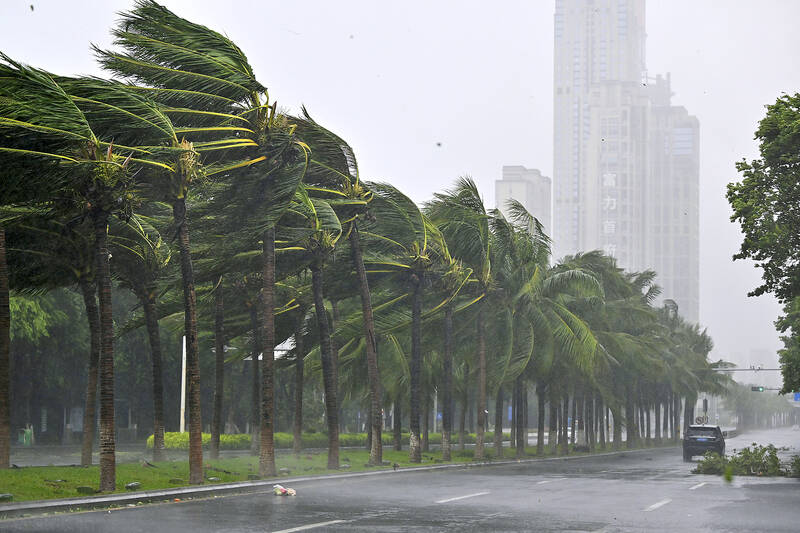Super Typhoon Yagi yesterday slammed into southern China’s Hainan island, bringing windspeeds of more than 230kph in what is set to be the strongest storm to hit the region in more than a decade.
Hainan Province evacuated more than 400,000 people ahead of the storm’s expected landfall, while tens of thousands prepared to seek shelter in neighboring Vietnam.
Yagi killed at least 13 people in the Philippines this week when it was still classified as a tropical storm, triggering floods and landslides on the main island of Luzon, before strengthening into a super typhoon over the past few days.

Photo: Xinhua via AP
The storm made landfall in China yesterday along the coast of Hainan, a popular holiday destination, and neighboring Guangdong Province at 4:20pm, Xinhua news agency reported, citing authorities.
In Hong Kong, a typhoon warning that had been in effect was lowered shortly after noon following heavy rains overnight as Yagi passed within 400km of the territory. Trading at the Hong Kong Stock Exchange was suspended yesterday and schools were closed.
Authorities said five people were injured in the territory due to the weather, but damage was limited.
Southern China is frequently hit during summer and autumn by typhoons that form in the warm oceans east of the Philippines and then travel west.
However, climate change has made tropical storms more unpredictable and increased their intensity, leading to heavy rains and violent gusts that cause flash floods and coastal damage, experts say.
Yagi is to head toward Vietnam after moving through southern China, on course to hit the northern and north-central regions around the famed UNESCO heritage site Halong Bay today.
The Vietnamese Ministry of Defense said that more than 457,000 personnel from the army, police and other forces had been put on standby.
Authorities have announced plans to close four northern airports, including Hanoi’s main international hub Noi Bai, for several hours today, while all coastal cities and provinces put sailing bans in place yesterday.
Residents in the northern port of Hai Phong and the capital, Hanoi, were stocking up on food and other necessities.
Tourist boats in Ha Long Bay had been brought ashore or taken into shelters.
Pham Quang Quyen, a resident of Quang Ninh Province, said from Tuan Chau island that he had never experienced such a typhoon warning in nearly two decades.
“I hope we will survive the typhoon as we have been very well prepared,” Quyen said.
“We are all very much used to dealing with storms and heavy rains here,” he said.

Taiwan is gearing up to celebrate the New Year at events across the country, headlined by the annual countdown and Taipei 101 fireworks display at midnight. Many of the events are to be livesteamed online. See below for lineups and links: Taipei Taipei’s New Year’s Party 2026 is to begin at 7pm and run until 1am, with the theme “Sailing to the Future.” South Korean girl group KARA is headlining the concert at Taipei City Hall Plaza, with additional performances by Amber An (安心亞), Nick Chou (周湯豪), hip-hop trio Nine One One (玖壹壹), Bii (畢書盡), girl group Genblue (幻藍小熊) and more. The festivities are to

Auckland rang in 2026 with a downtown fireworks display launched from New Zealand’s tallest structure, Sky Tower, making it the first major city to greet the new year at a celebration dampened by rain, while crowds in Taipei braved the elements to watch Taipei 101’s display. South Pacific countries are the first to bid farewell to 2025. Clocks struck midnight in Auckland, with a population of 1.7 million, 18 hours before the famous ball was to drop in New York’s Times Square. The five-minute display involved 3,500 fireworks launched from the 240m Sky Tower. Smaller community events were canceled across New Zealand’s

‘IRRESPONSIBLE’: Beijing’s constant disruption of the ‘status quo’ in the Taiwan Strait has damaged peace, stability and security in the Indo-Pacific region, MOFA said The Presidential Office yesterday condemned China’s launch of another military drill around Taiwan, saying such actions are a “unilateral provocation” that destabilizes regional peace and stability. China should immediately stop the irresponsible and provocative actions, Presidential Office spokeswoman Karen Kuo (郭雅慧) said, after the Chinese People’s Liberation Army (PLA) yesterday announced the start of a new round of joint exercises around Taiwan by the army, navy and air force, which it said were approaching “from different directions.” Code-named “Justice Mission 2025,” the exercises would be conducted in the Taiwan Strait and in areas north, southwest, southeast and east of Taiwan

UNDER WAY: The contract for advanced sensor systems would be fulfilled in Florida, and is expected to be completed by June 2031, the Pentagon said Lockheed Martin has been given a contract involving foreign military sales to Taiwan to meet what Washington calls “an urgent operational need” of Taiwan’s air force, the Pentagon said on Wednesday. The contract has a ceiling value of US$328.5 million, with US$157.3 million in foreign military sales funds obligated at the time of award, the Pentagon said in a statement. “This contract provides for the procurement and delivery of 55 Infrared Search and Track Legion Enhanced Sensor Pods, processors, pod containers and processor containers required to meet the urgent operational need of the Taiwan air force,” it said. The contract’s work would be